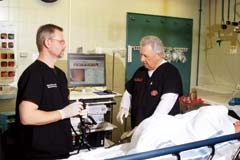OSU: Beating Colon Cancer
March is National Colon Cancer Month, and OSU Medical Center is especially focused on preventing this disease.
By: Mary Bransford | Category: Health & Fitness | Issue: March 2011

Dr. David James (right) discusses the findings of a patient’s endoscopy with Dr. Scott Hendrickson.
March is National Colon Cancer Month, and OSU Medical Center is especially focused on preventing this disease. Colorectal cancer, or colon cancer, is the second leading cancer killer in the United States, according to the Center of Disease Control and Prevention. However, if more people were regularly screened for this cancer, at least 60 percent of deaths from colon cancer could be avoided.
People age 50 or older should be regularly screened for colon cancer. Screenings can find polyps in the colon or rectum. These polyps, if undetected, can lead to colon cancer. If polyps are found during a screening, they can be removed before they turn into cancer. Early detection of polyps or cancer is important and if found early, the chance of being cured is good.
OSU Medical Center continues its mission of training future physicians with its gastroenterology (GI) fellowship training program. This fellowship program is the first one in the Tulsa region. David James, D.O., internal medicine and gastroenterology, is the Clinical Instructor of Gastroenterology at OSU Medical Center. Dr. James has been a teaching physician at OSUMC for more than 35 years and has seen the growing need for more gastroenterologist specialists in the Tulsa region.
“This is a very unique program because it involves not only OSU Medical Center but other medical facilities throughout the region that have a growing need for gastroenterology specialists,” Dr. James said. The gastroenterology program director is Leon Yoder, D.O. In January, Scott Hendrickson, D.O., internal medicine, and Jeff Hunt, D.O., internal medicine, began the gastroenterology fellowship. Hendrickson and Hunt are both involved in teaching the internal medicine residents and students at OSU Medical Center and will continue to teach while in their own training. OSUMC, under Dr. James’ expert leadership, is proud to oversee this program involving the support of other institutions.
Dr. James explains that there are several different screening tests that can be used to find polyps or colon cancer. “The U.S. Preventive Services Task Force recommends colon cancer screening for men and women age 50 and over using high-sensitivity fecal occult blood testing (FOBT), sigmoidosocopy or colonoscopy. It’s important to talk to your doctor about these screenings. Most insurance plans and Medicare help pay for colon cancer screening tests.”
The American Cancer Society has reported that only half of Americans age 50 or older have been screened for colon cancer. If everyone was screened as recommended, thousands of lives could be saved each year. Precancerous polyps and early-stage colon cancer do not always have symptoms, especially at first. That’s why screening is important to keep colon cancer away. Some symptoms of colon cancer may include blood in or on your stool, stomach pain, aches or cramps that don’t go away, and losing weight and you don’t know why. These symptoms may be caused by something else other than cancer, so talk to with your doctor.
“The endoscopy department at OSU Medical Center offers the most state-of-the-art technology for our patients and training for the physicians of tomorrow,” Dr. James said. With the purchase of new HD endoscopy towers and scopes, the endoscopy department is able to serve patients even better than before.
“The new tower and scopes provide a better picture, which helps us give the patients an even higher quality of care than before,” said Janet Maxwell, head nurse in the endoscopy center. The towers house peripheral devices for recording the endoscope’s images. The images are saved and can be printed all from the same tower.
Training physicians has been a tradition at OSUMC for over 66 years. The GI fellowship program enables OSUMC to continue offering the best training in GI care throughout Oklahoma. The endoscopy department at OSU Medical Center is located on the first floor. You can reach the department by calling (918) 599-5420.
Need a physician? Call (918) 599-4OSU for OSU Medical Center’s Physician Finder.
For more information, contact
OSU Medical Center
(918) 599-4OSU
OSU Medical Center
For more information, contact:
OSU Medical Center
OSU Medical Center Online:
More about OSU Medical Center:
More ArticlesCurrent Coupons/OffersSubscribe
For Free!
